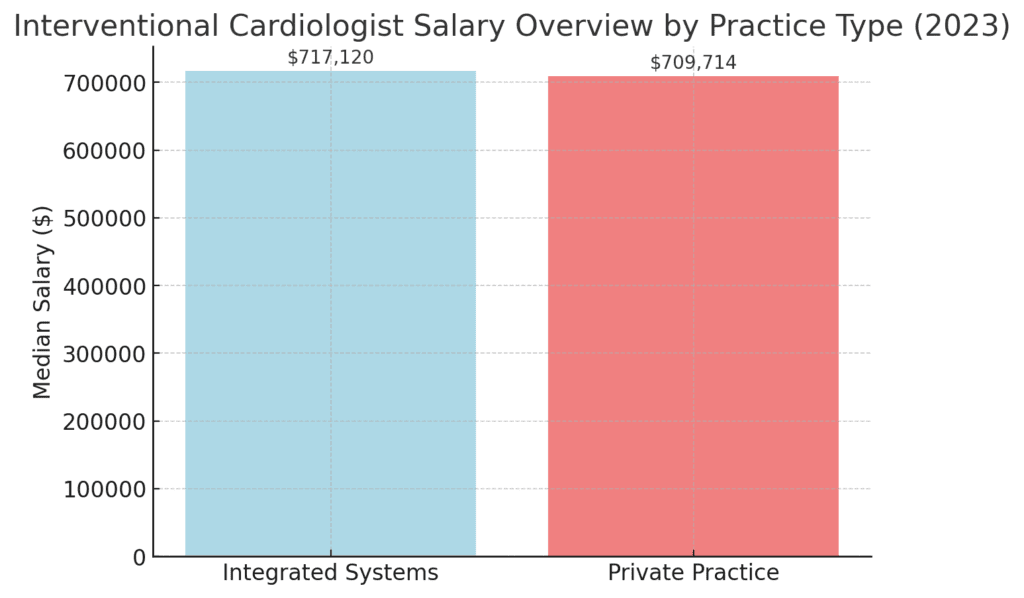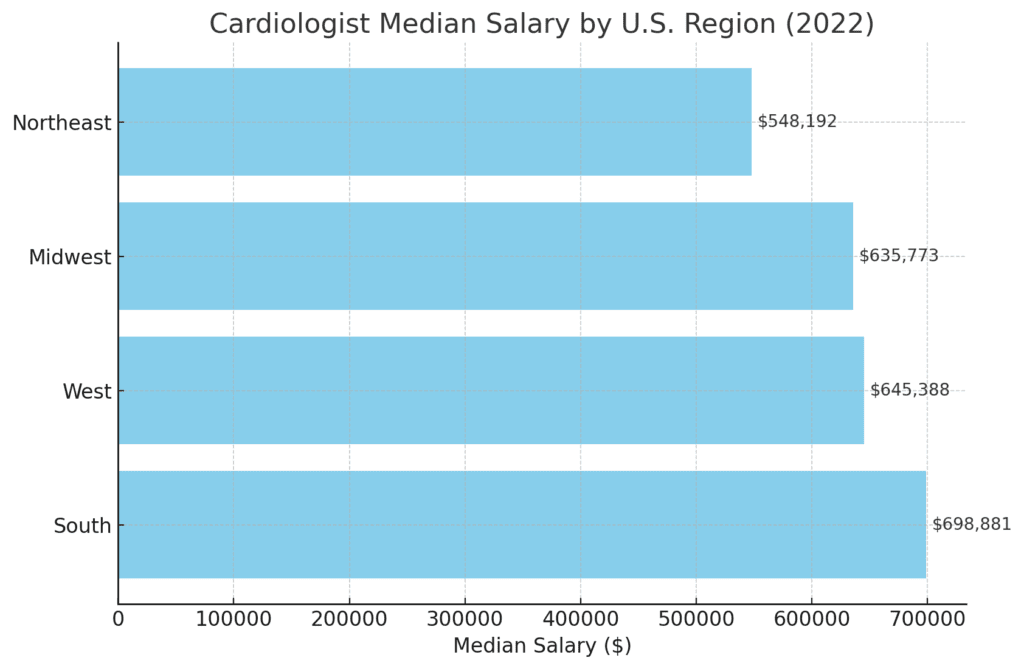Table of Contents:
- Introduction
- Interventional Cardiologist Salary Overview
- Factors Affecting Salaries
- Private vs. Integrated Ownership Models
- Regional Differences in Compensation
- Compensation by Subspecialty
- Workload and Productivity
- Gender and Age Impact on Salary
- Conclusion
- FAQs
1. Introduction
Ever wondered what an interventional cardiologist salary was? These doctors are specialists who perform procedures to treat heart conditions, like stenting and angioplasty. With such a vital role, you’d expect them to earn top-dollar salaries, right? Well, let’s dive into the numbers and find out how much these heart experts actually make!
2. Interventional Cardiologist Salary Overview
The salary for an interventional cardiologist varies, but on average, these specialists can earn around $700,000 per year! That’s more than many other cardiology subspecialties. The exact number depends on factors like where they work, their experience, and whether they’re in private practice or employed by a health system.
Interestingly, the 2023 Cardiovascular Provider Compensation & Production Survey shows that interventional cardiologists sit near the top of the cardiology earnings list, second only to electrophysiologists. Interventional cardiologists in integrated systems (like hospital-employed doctors) had a median salary of $717,120, while those in private practice earned a bit less, at $709,714.

3. Factors Affecting Salaries
Why don’t all interventional cardiologists earn the same amount? A few key factors come into play:
A. Ownership Model
There are two main ownership models: private practice and integrated (employed by hospitals or health systems). Private practice cardiologists may earn less than their integrated counterparts, but they often have more control over their schedules and decisions.
In 2022, the gap between private and integrated cardiologists’ salaries widened, with integrated doctors earning over $57,000 more on average than private practitioners.
B. Experience
Just like in any job, the more experienced you are, the more you typically earn. Newly graduated interventional cardiologists may start on a lower salary, while those with many years of experience can command higher pay.
C. Workload
Doctors who take on more patients or perform more procedures, such as percutaneous coronary interventions (PCI), can expect higher earnings. Productivity directly affects earnings in this field.
D. Advanced Practice Providers (APPs)
Both private and integrated practices use Advanced Practice Providers (APPs), such as nurse practitioners, to assist with patient care. This support can affect how many procedures a cardiologist performs, indirectly impacting their salary.
4. Private vs. Integrated Ownership Models
When it comes to ownership models, the difference between private practice and integrated systems is crucial. Private cardiology groups tend to be larger, with a median size of 19.1 physicians compared to 9.3 physicians for integrated practices. But this difference in size also reflects on salary:
- Private Practice Median Salary (2022): $588,272
- Integrated Practice Median Salary (2022): $645,388
As we can see, integrated practices tend to offer higher salaries. One reason could be the operational resources available in larger hospital systems, which allow integrated cardiologists to focus more on performing procedures rather than administrative tasks.
5. Regional Differences in Compensation
Where a cardiologist practices has a big impact on their salary. In 2022, the South led the nation in cardiologist earnings, with a median of $698,881! The Northeast, however, lagged behind with a median salary of $548,192.
Here’s a breakdown of median salaries by region:
- South: $698,881
- West: $645,388
- Midwest: $635,773
- Northeast: $548,192

Why the difference? The South tends to have more private practices, which typically offer higher productivity but slightly lower compensation compared to integrated models. Meanwhile, the Northeast has a higher concentration of integrated practices, but often with lower compensation than in the South or West.
6. Compensation by Subspecialty
Interventional cardiologists aren’t the only specialists in cardiology. Some other subspecialties include:
- Electrophysiology (EP): $714,976
- Invasive (Non-Interventional): $662,006
- General/Non-Invasive: $585,849
- Advanced Heart Failure (HF): $575,000
While EP specialists top the salary chart, interventional cardiologists aren’t far behind. This makes sense, considering that both EP and interventional cardiologists perform high-risk, complex procedures that require specialized training.
7. Workload and Productivity
Interventional cardiologists tend to be among the highest producers of work relative value units (wRVUs), a metric used to measure the value of healthcare services. Private cardiologists often outproduce their integrated peers, especially in subspecialties like advanced heart failure.
Here are the median wRVUs for various cardiology subspecialties:
- Electrophysiology (EP): 13,118
- Interventional: 11,756
- Invasive (Non-Interventional): 10,334
- General/Non-Invasive: 8,870
- Advanced HF: 5,994
As you can see, interventional cardiologists produce a lot of wRVUs, contributing to their high compensation levels. But they also work hard, managing heavy caseloads and performing intricate procedures like stent placements and angioplasties.
8. Gender and Age Impact on Salary
Interestingly, gender also plays a role in salary differences. In 2022, male cardiologists earned 10% more than their female counterparts, with men earning a median salary of $628,601 compared to $559,174 for women. The reasons for this difference could include factors like workload, call participation, and even family responsibilities.
Age also impacts salary:
- Cardiologists in their 40s and 50s tend to earn the most, as they’re in their prime working years.
- Those over 60 still earn well but tend to slow down, earning slightly less than their younger counterparts.
9. Conclusion
The salary of an interventional cardiologist is undoubtedly impressive. With compensation nearing $700,000 a year, this subspecialty is among the top earners in the medical field. However, factors like experience, workload, region, and gender can all affect how much an individual cardiologist brings home. Whether in private practice or integrated systems, interventional cardiologists remain crucial in saving lives and treating heart disease, which certainly deserves the hefty paycheck!
10. FAQs
1. How much does an interventional cardiologist make in the South?
Interventional cardiologists in the South earn a median of $698,881, the highest in the country.
2. Does gender affect cardiologist salaries?
Yes, in 2022, male cardiologists earned 10% more than their female counterparts.
3. Which cardiology subspecialty pays the most?
Electrophysiologists top the chart, earning a median salary of $714,976 in 2022.
4. Do private practice cardiologists earn more than integrated ones?
Integrated cardiologists tend to earn more, with a median salary of $645,388 compared to $588,272 for private practice cardiologists.
5. What region has the lowest cardiologist salary?
The Northeast had the lowest median salary for cardiologists, at $548,192 in 2022.
Other Articles you may enjoy!
Interventional Cardiologist Salary: A Guide for 2024
Cardiologist Salary: Overview of Earnings in 2024
Electrophysiologists Salary in 2024










